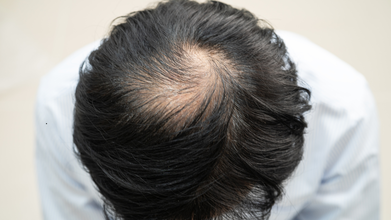- Health Conditions A-Z
- Health & Wellness
- Nutrition
- Fitness
- Health News
- Ayurveda
- Videos
- Medicine A-Z
- Parenting
Aromatherapy’s Anti-Aging Elixir: 4 Essential Oils That Can Transform Your Skin

Aromatherapy’s Anti-Aging Elixir: How 3 Essential Oils Can Transform Your Skin
While there is no dearth of products for anti-ageing but people are turning towards essential oils for this particular concern as they are natural and more than just skin care they have a holistic effect. As people age, the skin begins to break down and lose elasticity. This natural process causes wrinkles and fine lines to appear on the face around the forehead, mouth, and eyes.
Although essential oils will not eliminate wrinkles completely, they may be able to reduce their appearance. They are also a natural alternative to chemical creams and lotions. They may also:
- boost collagen
- even out skin tone
- help your complexion
- reduce inflammation
- promote skin cell turnover
- protect your skin from environmental damage
Now that we spoke so highly of essential oils for anti-ageing let us look at the oils, we can turn to for this –
Sandalwood
Sandalwood essential oil is one of the most fragrant of all oils that have been used widely in the beauty industry. It possesses a unique earthy aroma and holds a significant role in healing skin woes. The strong antioxidant nature of this oil is effective in scavenging free radicals from the skin and reduces oxidative damage. Furthermore, it flushes out the toxins from the skin and uplifts overall skin health and glow.
Lemon
Lemon is well-known for its vitamin C content and potential health benefits for the immune system. However, lemon oils are also used in a variety of commercial skin care products to help reduce the signs of aging, such as wrinkles. All citrus essential oils, including lemon and grapefruit, make the skin more sensitive to sunlight. It is essential to avoid sun exposure for several hours after using citrus essential oils, so it is wise to apply them before bed.
Rosemary
The potent antimicrobial and antioxidant traits of rosemary essential oil help to cure skin problems like dermatitis, eczema, and rosacea. It is beneficial in maintaining the overall health and beauty of the skin. Rosemary essential oil is known to avert the alteration of the natural lipids of the skin surface and slow down signs of ageing.
Frankincense
Frankincense oil is well known for their potential to promote cell regeneration, fade away fine lines and wrinkles, and improve skin elasticity.
Vitamin C Serum Before and After: What Changes to Expect?

Vitamin C is a star ingredient in the skincare world for some very good reasons. It can be hailed as a magic wand to evaporate your stubborn marks and give you a brighter complexion.
However, no matter what product you use, the results do not appear overnight. So, what do real results look like? What does a before-and-after journey of using a Vitamin C serum actually entail?
This guide covers everything about the before-and-after results of using the Vitamin C serum.
What Is Vitamin C Serum and How Does It Work on Skin?
It is a potent antioxidant that can be applied to your skin directly. It neutralises the effects of free radicals, which are tiny and unstable molecules caused by pollution and UV rays. They can easily damage your skin and accelerate ageing.
Vitamin C helps by boosting collagen production and improving skin tone. This is why the results of Vitamin C on the face are so dramatic. It changes the flat look of your skin to a healthy glow.
Key benefits include:
· Brightening: It blocks the enzyme responsible for producing pigment, leading to more radiant skin.
· Fading Marks: A remarkable ingredient for targeting sun damage and acne scars.
· Collagen Stimulation: It keeps your skin bouncy and firm.
· Protection: It provides a second layer of defence against environmental stress.
Before and After Vitamin C Serum: What to Expect on Your Face
Consistent use of the serum for several weeks, along with daily application of sunscreen with SPF 50 can yield noticeable results. Here’s what you can expect from it.
Before Using Vitamin C Serum
Your skin may show signs of environmental wear and tear before you start using a serum. The following are some common complaints:
· Your skin looks tired, even after a full night's sleep.
· You may have patchy skin or dark areas around the mouth and forehead.
· Old acne spots or sun freckles that refuse to fade.
· Skin that feels slightly rough or looks congested.
After Consistent Use
The changes in your face before and after using a vitamin C serum become evident after your skin integrates the serum into its renewal cycle:
· It will give you that lit-from-within look.
· Dark spots become significantly lighter and blend into your natural skin tone.
· Your skin feels more elastic and youthful due to increased collagen.
· The surface of your skin looks smoother.
Timeline of Vitamin C Serum Before and After Results
First Week: Initial Freshness & Surface Glow
There is little change in dark spots during the first few days. However, you may notice an immediate glow on your skin surface. The serum hydrates and smoothens the skin's surface, helping makeup sit better. Vitamin C for dark spots before and after signs are clearly visible.
2–4 Weeks: Brightening & Early Spot Lightening
You will start to see the before-and-after progress of vitamin C on dark spots around this stage. Its pigment-blocking properties start to kick in. You may notice that your overall skin tone looks fresher and that the edges of your dark spots are now fading.
4–8 Weeks: Visible Even Tone and Improved Texture
The difference between your face before after vitamin C serum will be more obvious by the end of the second month. The deeper layers of the skin benefit from the antioxidant protection. You can expect the following changes:
· Visibly less sun damage
· Even complexion, so you may not need concealer
· Fewer rough patches
8–12 Weeks: Long-Term Transformation
After 90 days, your skin has gone through multiple renewal cycles. Your Vitamin C serum before-and-after photos may show significant improvement in hyperpigmentation. Fine lines may reduce because of the increased collagen, as your skin looks the healthiest it has in years.
Tips to Maximize Your Vitamin C Serum Before and After Results
If you want your before-and-after vitamin C serum results to be impressive, you need to follow these simple rules:
1. Morning is Best: Apply your serum in the AM. This allows the antioxidants to protect your skin from pollution and sunlight throughout the day.
2. Pair with Sunscreen: Always follow up with a sunscreen. Vitamin C is not a replacement for sunblock, but it actually makes your sunscreen with SPF 50 more effective by neutralizing the rays that slip through.
3. Storing the Serum: Vitamin C is sensitive to light and air. Keep your bottle in a cool, dark place (such as a drawer) to ensure it does not lose its potency. If your serum has become dark or orange in colour, it may have been oxidised. So, it may not work well.
4. Consistency: You do not need a huge amount of serum. 3–4 drops are enough. You need to apply it every single day without skipping.
Final Thoughts
The journey of your face before and after Vitamin C serum can feel long, but the results are worth it. It can be exciting to see the initial glow. However, the real changes, such as fading deep dark spots and firming the skin, take time. Stick to a routine and pair your skin with a high-quality sunscreen to stay radiant and youthful.
Ancient Chinese Medicine Could Hold The Secret To Hair Regrowth

Credits: Canva
Can Chinese medicine cure baldness? Baldness has long been dealt as a matter of shame over health. Products focus on hiding the bald patch rather than curing it. Baldness has in the past made global headlines when South Korean president Lee Jae Myung said 'Baldness is the new enemy' and suggested that insurance should cover the treatment as a part of medical treatment.
Androgenetic alopecia (AGA), better known as pattern hair loss, is the most common form of hair thinning worldwide. While medications like finasteride and minoxidil remain the standard line of treatment, concerns around side effects, lifelong use, and mixed results have led many people to explore gentler, more holistic alternatives.
A new scientific review now suggests that Polygonum multiflorum—a root used in traditional Chinese medicine for over a thousand years—may hold real promise in managing AGA. Historically described as a remedy that can “blacken hair and nourish essence,” the herb is gaining renewed attention as modern research begins to unpack how it actually works at a biological level.
A Multi-Pathway Approach to Hair Health
Most conventional hair-loss treatments target a single biological mechanism. Polygonum multiflorum, however, appears to work on several fronts at once. According to the review, the herb helps reduce the activity of dihydrotestosterone (DHT), a hormone strongly associated with hair follicle shrinkage in AGA.
At the same time, it protects hair follicle cells from premature cell death and activates key growth-related signalling pathways, including Wnt and Sonic Hedgehog (Shh), both crucial for maintaining a healthy hair growth cycle. The herb may also improve scalp blood circulation, potentially enhancing the delivery of oxygen and nutrients to hair follicles—an often overlooked factor in hair thinning.
Ancient Records Meet Modern Biology
“Our analysis bridges ancient wisdom and modern science,” said Han Bixian, the lead author of the review published in the Journal of Holistic Integrative Pharmacy. “What surprised us was how consistently historical texts—from the Tang Dynasty onward—described effects that align closely with today’s understanding of hair biology.”
The researchers examined a wide range of evidence, including laboratory studies, clinical observations, and historical herbal literature. Together, these sources suggest that Polygonum multiflorum does more than simply slow hair loss—it may actively support healthier hair function.
Beyond Slowing Hair Loss
One of the most striking findings is the herb’s potential role in hair regeneration. Rather than only delaying further thinning, Polygonum multiflorum appears to influence multiple growth factors involved in restarting and sustaining the hair cycle. This broader mode of action could give it an edge over treatments that focus on just one biological target.
Safety, Processing, and What Comes Next
The review notes that when properly processed—a critical step in traditional preparation, the herb shows a relatively favorable safety profile. This could make it more appealing to patients concerned about side effects such as sexual dysfunction or scalp irritation commonly linked to existing medications.
That said, the authors stress the need for more high-quality clinical trials to confirm effectiveness, establish safe dosing, and standardize preparation methods. Even so, the findings highlight how rigorous scientific study of traditional remedies can uncover new possibilities for treating common conditions like androgenetic alopecia.
AI Chat Bots Are Giving Inaccurate Medical Advice, Says Study

Credits: Canva
As artificial intelligence becomes a go-to source for quick answers, a new University of Oxford-led study on AI chatbots and medical advice is raising serious concerns about how safe it is to rely on these tools for health guidance.
The research suggests that while AI chatbots can provide medical information, their advice is often inaccurate, inconsistent, and difficult for users to interpret, potentially putting people at risk—especially when dealing with symptoms that need urgent care.
What the Oxford Study Found
The study involved 1,300 participants who were given realistic health scenarios, such as experiencing a severe headache or being a new mother feeling constantly exhausted. Participants were divided into two groups: one group used AI chatbots to understand their symptoms and decide next steps, while the other did not.
Researchers then assessed whether participants correctly identified what might be wrong and whether they made appropriate decisions, such as seeing a GP or visiting A&E.
The results were troubling. People who relied on AI frequently failed to identify the severity of their condition and were often unsure about when to seek professional medical help.
Why Chatbot Advice Can Go Wrong
According to the researchers, one major issue is that people don’t always know what to ask. The study found that chatbot responses varied widely depending on how questions were phrased. Even small changes in wording could lead to completely different answers.
The AI often produced a mix of helpful and misleading information, leaving users to decide which advice mattered. Many participants struggled to distinguish between reliable guidance and unnecessary or confusing details.
As one of the study’s authors explained, when an AI lists multiple possible conditions, users are left guessing which one applies to them—precisely the moment where mistakes can happen.
A Dangerous Gap in Symptom Interpretation
Dr Rebecca Payne, lead medical practitioner on the study, warned that asking chatbots about symptoms could be “dangerous”, particularly when users delay seeking professional care based on AI responses.
Dr Adam Mahdi, the study’s senior author, noted that while AI can share medical facts, people often share information gradually and leave out key details—something chatbots struggle to manage effectively.
Bias, Data, and the Limits of AI
Experts also point out that chatbots are trained on existing medical data, which means they may repeat long-standing biases baked into healthcare systems. As one psychiatry expert put it, a chatbot is only as accurate as human clinicians—and humans are far from perfect.
That said, not everyone is pessimistic.
What Comes Next for AI in Healthcare
Digital health experts argue the technology is evolving. Health-specific versions of general AI chatbots have recently been released by major developers, and these could perform differently in future studies.
The consensus among experts is clear: AI in healthcare should focus on improvement, regulation, and guardrails, not replacement of doctors. Used responsibly, it may support healthcare—but without safeguards, it risks doing more harm than good.
© 2024 Bennett, Coleman & Company Limited

